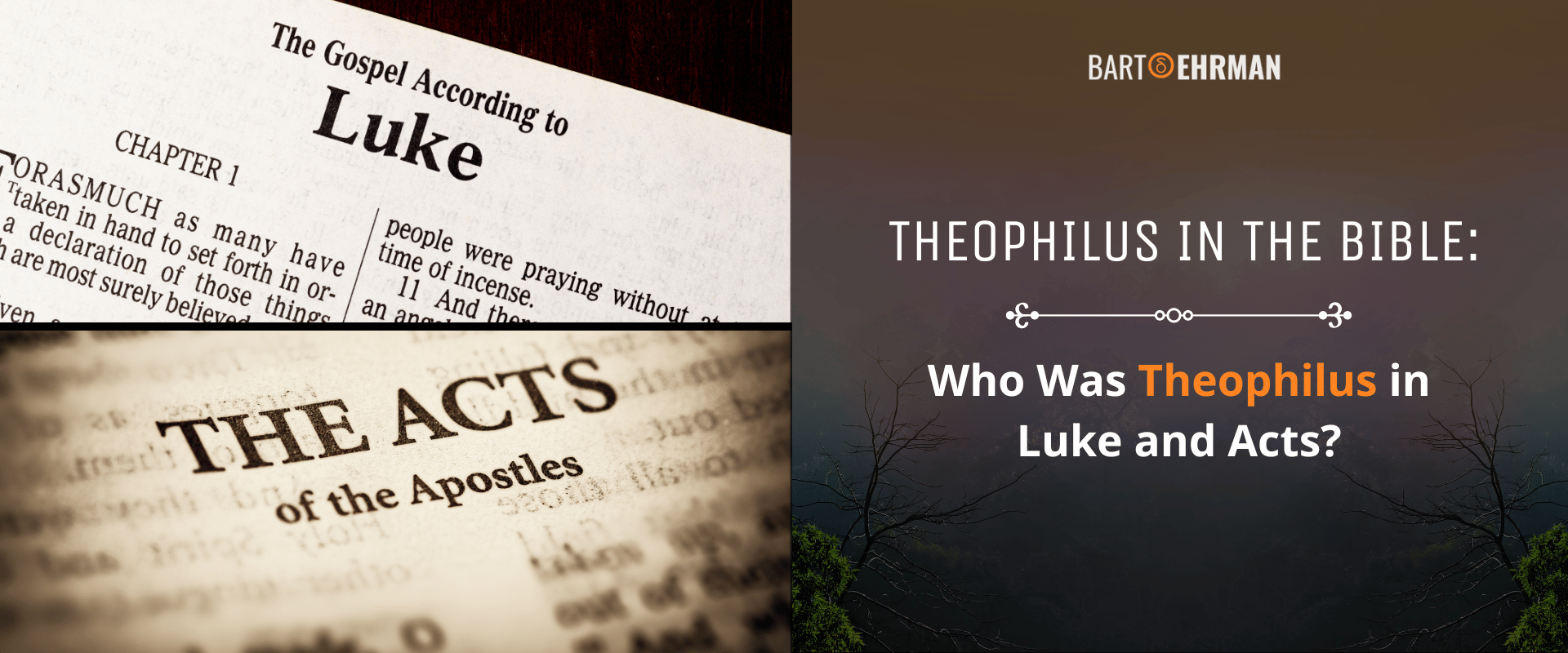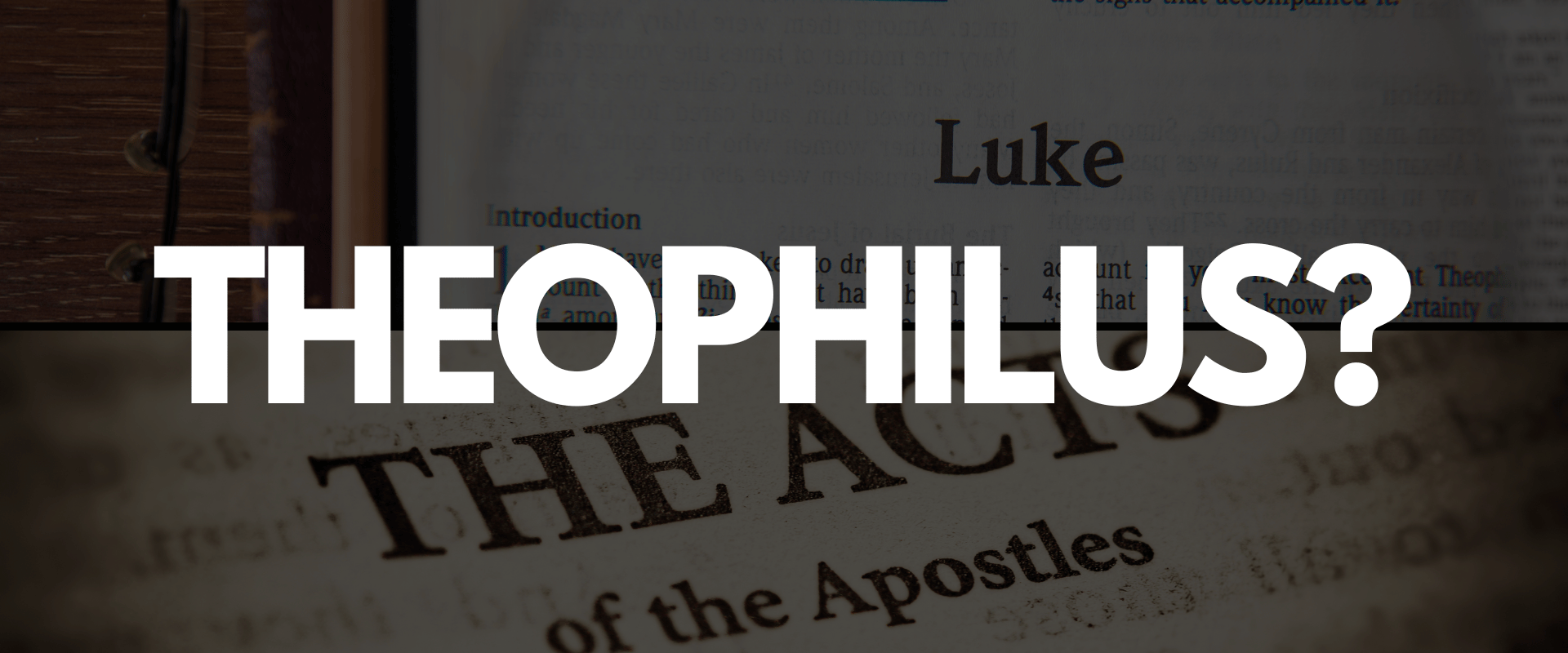Theophilus in the Bible: Who Was Theophilus in Luke and Acts?

Written by Joshua Schachterle, Ph.D
Author | Professor | Scholar
Author | Professor | BE Contributor
Verified! See our editorial guidelines
Verified! See our guidelines
Edited by Laura Robinson, Ph.D.
Date written: September 21st, 2024
Disclaimer: The views and opinions expressed in this article belong to the author and do not necessarily match my own. - Dr. Bart D. Ehrman
A person named Theophilus makes a brief but intriguing appearance in the Bible. Emerging only in two books of the New Testament, he appears at the beginning of the Gospel of Luke and again at the start of the book of Acts. With so little evidence of him, can we know anything about who he was?
In this article I’ll explore theories about his identity, assessing the available evidence to offer a clearer picture of who this mysterious Theophilus might have been.

Who Was Theophilus in the Bible?
Theophilus was a common Greek name in the 1st century CE and meant either “friend of God” or “beloved by God.” However, the Theophilus we’re concerned with is mentioned only twice in the Bible. Before I give you those verses, though, we need to talk a bit about the authors of the Gospel of Luke and the book of Acts, the two biblical texts containing references to Theophilus.
In her Introduction to the Synoptic Gospels, Pheme Perkins notes that the majority of scholars place the writing of Luke somewhere between 80-110 CE. In addition, she mentions that the anonymous author of Luke also wrote the book of Acts. According to Delbert Burkett’s book An Introduction to the New Testament and the Origins of Christianity, Luke and Acts were two volumes of the same larger work. Later New Testament compilers separated the two by placing Luke among the four Gospels and Acts immediately following them.
Why does this matter in our investigation of Theophilus? The two references to Theophilus come in the prefaces of those two books, one at the beginning of Luke and the other at the beginning of Acts. This is one of the ways scholars identified them as having the same author. Let’s look at what these two prefaces say.
Concerning Theophilus in Luke, we see this paragraph in Luke 1:1-4:
Since many have undertaken to compile a narrative about the events that have been fulfilled among us, just as they were handed on to us by those who from the beginning were eyewitnesses and servants of the word, I, too, decided, as one having a grasp of everything from the start, to write a well-ordered account for you, most excellent Theophilus, so that you may have a firm grasp of the words in which you have been instructed.
What information does this preface give us? Bart Ehrman, in his Brief Introduction to the New Testament, writes that Luke’s preface is similar to other prefaces from that time period (80-110 CE), especially those written by Greek historians. He further notes that this preface, written in what is certainly the most polished Greek of any of the Synoptic Gospels, signals that his book is meant to be a serious piece of ancient historical writing.
The author also acknowledges that several others have already written stories of Jesus’ life before him, based on stories from “eyewitnesses and servants of the word.” He is admitting, then, that he made use of these earlier written and/or oral sources. As Ehrman notes, scholars generally agree that these sources include the Gospel of Mark, a theoretical document known as Q (although many scholars have questioned its existence), and a third source scholars simply call L. However, Luke’s author says his account will be kathexēs, meaning “well-ordered or accurate.” Ehrman notes that this could be read as a knock against those earlier writings.
Finally, the author says he is writing the account “for you, most excellent Theophilus, so that you may have a firm grasp of the words in which you have been instructed.” It may seem at first glance that this doesn’t give us a lot of information about Theophilus, but let’s look more closely.
The Greek word translated as “most excellent” is kratiste. In the Cambridge Greek Lexicon, the root word that kratiste is based on appears in one ancient philosophical text by Theophrastus (c. 371–287 BCE), describing how a deferential man would address an aristocrat. This could mean, then, that “most excellent Theophilus” was a Roman official, likely one who was the patron of the author of Luke. What would this mean?
In ancient Roman society, patrons were wealthy benefactors who, in the context of writing texts, would finance the activity, paying for the expensive writing materials and even for copyists who helped circulate the writing publicly. The patron was typically in a higher social class than the client. In the edited volume of Worlds Together, Worlds Apart: A History of the World from the Beginnings of Humankind to the Present, Elizabeth Pollard writes that in the Roman empire, these patron-client relationships involved everyone, from the emperor down to the lowest commoner.
It is, thus, highly likely that someone addressed as “most excellent” in the preface to a writing was the author’s patron. In fact, more evidence of this and of Theophilus’ status can be seen in who else is addressed as “most excellent” in the book of Acts.
In Acts 24, Paul is arrested and brought before the procurator or governor of Judea named Felix. In the second verse, someone named Tertullus accuses Paul of disturbing the peace and addresses the governor as “most excellent Felix” (kratiste Phēlix). It’s used in a similar way in Acts 26:25, where Paul himself addresses Felix’s successor Festus as “most excellent Festus.” This identifier certainly makes it plausible that Theophilus was a wealthy Roman official who was the author’s patron and commissioned Luke and Acts.
Looking at Theophilus in Acts, which, again, is really the second volume of a larger work scholars often call “Luke-Acts, ”the author again addresses Theophilus in Acts 1:1-5:
In the first book, Theophilus, I wrote about all that Jesus began to do and teach until the day when he was taken up to heaven, after giving instructions through the Holy Spirit to the apostles whom he had chosen. After his suffering he presented himself alive to them by many convincing proofs, appearing to them during forty days and speaking about the kingdom of God. While staying with them, he ordered them not to leave Jerusalem but to wait there for the promise of the Father. “This,” he said, “is what you have heard from me; for John baptized with water, but you will be baptized with the Holy Spirit not many days from now."
First, this preface confirms that Acts is merely the second book or volume of the larger work beginning with the Gospel of Luke and that, like its predecessor, this volume is written for Theophilus. Again, Bart Ehrman notes in his Brief Introduction to the New Testament that this kind of preface, which includes a recap of the previous volume, was common in works of ancient history. Beyond this, though, we don’t get a lot more information about Theophilus here.
However, given the evidence we have it seems logical to conclude that Theophilus was probably a wealthy Roman aristocrat, likely a Christian or at least open to Christianity since Luke’s preface says Theophilus was instructed about the themes of the Gospel.
However, people have other theories about Luke-Acts’ addressee, too. Let’s examine a few.
FREE COURSE!
WHY I AM NOT A CHRISTIAN
Raw, honest, and enlightening. Bart's story of why he deconverted from the Christian faith.
Over 6,000 enrolled!
Was Theophilus a Person or People?
There are many biblical figures about whom very little is said in the Bible. Over the centuries, theories and mythologies have grown up around such people. As an example, the magi — the three wise men who visit the infant Jesus — are found only in Matthew 2:1-12 and unnamed. And yet, later Christians granted them names and embellished their story (for a great look at the history and meaning of the magi, read The Magi: Who They Were, How They’ve Been Remembered, and Why They Still Fascinate by Eric Vanden Eykel).
Theophilus gets even less space in the Bible than the magi, leaving centuries of readers to speculate about his identity. In the first section of this article, I did some historical speculation about the possibility that he was a Roman official and patron of the author of Luke-Acts. Now let’s look at other things people have proposed about Theophilus.
One theory that has proliferated over time says that since Theophilus means “friend of God” or even “lover of God” in Greek, perhaps the author of Luke-Acts was merely addressing his writing to a Christian community or even all Christians. You might think of it like a Boy Scout manual that addresses the reader as “scout” as in “Well, scout, it’s time to earn your badges.” Although scout is a singular word, this usage addresses all scouts who read the book.
Accordingly, author Doug Redford, in his The Life and Ministry of Jesus, the Gospels: New Testament Volume 1, notes that several non-canonical gospels were addressed to a general audience of Christians rather than a specific patron, and that the name “Theophilus” may, therefore, have simply been a cipher representing Christians generally. While Redford is not a biblical scholar, this claim is not completely implausible. However, the evidence for it is thin compared to that for Theophilus as a wealthy patron.
Other Theories About Theophilus in the Bible
An attorney named John Mauck, in his book Paul On Trial: The Book Of Acts As A Defense Of Christianity, posits that Theophilus was Paul’s lawyer during his trial in Rome. As proof, Mauck points to phrases in Acts he claims are explicitly legal terms such as "eyewitnesses," "account," "carefully investigated," and "know the certainty of things which you have been instructed." However, Mauck is not a biblical scholar and doesn’t read Koine Greek, the original language of the New Testament. The Greek originals of those supposedly legal phrases are terms which any educated Greek-speaker at the time might have used. Mauck’s claim is, therefore, not historically credible, especially since there is literally no evidence tying someone named Theophilus to Paul’s trial.
Several centuries ago German theologian Theodore Hase (1682-1731) pointed out that, according to 1st-century Jewish historian Josephus, the High Priest from 37-41 CE was named Theophilus ben Ananus. Hase theorized that this High Priest was the recipient of Luke-Acts. He bases his argument on the fact that, as a High Priest, Theophilus would have to have been a Sadducee, and Jesus argues with Sadducees in Luke 20:27-40 about the resurrection.
This stance is interesting, if, indeed, Josephus was correct. However, we know that Luke-Acts was written at least 40 years after the priesthood of Theophilus ben Ananus, making it unlikely the author would have had a relationship with him if this High Priest were even still alive. Additionally, Luke’s treatment of “the Jews,” while it’s perhaps not as damning as John’s, is antisemitic, nonetheless. It thus seems unlikely that the gentile author of Luke-Acts would have written so deferentially to a Jewish High Priest about Jesus.

Conclusion
Authors include insignificant bits of information in their writings all the time. Most of the time, if a novelist tells us that a character brushed his teeth at 3:00 before going out, it might not matter all that much. However, because people view the Bible as sacred and divinely inspired, it’s impossible for many to believe that the inclusion of any part occurred without a spiritual purpose.
The most historically credible reason for why the author of Luke-Acts addresses his two-volume work to Theophilus is that he was the author’s patron. Theophilus may have been a wealthy Roman official, as the title “most excellent” is also used in Acts to address two different governors. If so, Theophilus was a Christian or prospective Christian who paid for the writing of Luke-Acts and, thus, had to be honored within the work itself.
However, there have been many other theories about who Theophilus was. Perhaps, say some, he was not a real person but merely a representation of the intended Christian audience of Luke-Acts. That could explain why he was given a name which meant “friend of God,” identifying them and convincing them this was a work written for them.
On the other hand, perhaps Theophilus was Paul’s lawyer, or the High Priest in the Temple. In the absence of evidence, people tend to fill in their own explanations. But not all of them are equally credible. There is zero evidence tying someone named Theophilus to Paul’s trial, and while there may have been a High Priest named Theophilus, he was High Priest decades before the writing of Luke-Acts.
To add to the difficulty of identifying him, Theophilus was quite a common name in the Greco-Roman world of the 1st century. Ultimately, while some explanations for who Theophilus was make more historical sense than others, we just can’t know the answer for certain.

